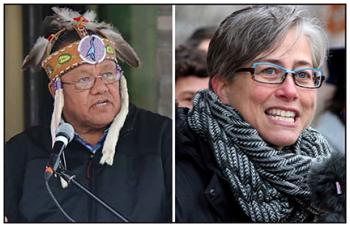Image Caption
Summary
Local Journalism Initiative Reporter
Windspeaker.com
Clarification made Feb. 2 on the small area of the Greater Golden Horseshoe where MNO claims a historic community.
Last week, the federal government announced that the Métis Nation of Ontario (MNO) was the recipient of just over $1.3 million in funding from Environment and Climate Change Canada to be used, in part, to acquire a minimum of 40 hectares of wetlands for long-term conservation.
“These protected lands will not only help to harness natural systems to combat climate change, but they will also support a landscape that can support many aspects of the Métis way of life,” said MNO President Margaret Froh, in a statement. Windspeaker.com had requested an interview with Froh but was provided with a written statement instead.
Chiefs of Ontario (COO) view the funding as Ottawa supporting “the MNO’s illegitimate claims to First Nations’ Ancestral and Treaty territories.”
In a news release issued by COO in response to Windspeaker.com’s request for an interview, Regional Chief Glen Hare said MNO’s move to acquire the land underscores First Nations’ concerns that Bill C-53, Recognition of Certain Métis Governments in Alberta, Ontario and Saskatchewan and Métis Self-Government Act, is about land for the MNO.
The COO has been joined by other First Nations organizations in Ontario, including Wabun Tribal Council and the Robinson-Huron Waawiindamaagewin, with concerns that the MNO is claiming First Nations ancestors as their own in an effort to claim lands.
In earlier interviews with Windspeaker.com, Froh said Bill C-53 is only self-government implementation legislation that performs “a function of giving Canada the tools it needs to be able to formally recognize our governance and that cradle for that ongoing nation-to-nation, government-to-government relationship.”
Froh has contended that the legislation has nothing to do with land, although supplemental self-government agreements to be negotiated in the future could include land and resources.
“But in the event that those types of things happen, then clearly…when we're talking about lands in particular, there would have to be some conversation. There would have to be a determination of whether or not there was interest and, if there was, then the duty to consult would apply,” she said. “So these agreements and the modern self-government treaties that will come do not deal with land or land-related issues,” she said.
The funding MNO has received will support its Sofgardé la Tèr Project in the Greater Golden Horseshoe in southern Ontario. The protected lands will not only allow the MNO to combat climate change but provide a natural area for the knowledge transfer of Métis teachings.
The Greater Golden Horseshoe is not part of the Métis National Council’s 2018 Métis homeland map. The northern end of the Greater Golden Horseshoe overlaps a small portion of land to which the Georgian Bay Métis community asserts rights and has been recognized by the Ontario government since 2017 as among the six additional historical communities claimed by MNO.
“This is simply just the latest example of the MNO further attempting to claim a land base that historically has never existed in Ontario,” Hare said in his press statement. “As the MNO does not have a land base in Ontario, the MNO should not and cannot be arbitrarily given funding to execute projects that affect land-based rights,” he continued.
Hare said that it is “extremely evident now (that) the MNO are proving a clear desire and intention to pursue land.”
The funding to the MNO by Environment and Climate Change Canada was part of $12.8 million announced on Jan. 26 to support 27 Indigenous-led natural climate solutions initiatives across Canada. At $1.337 million MNO’s project received the most dollars and was the only Métis-led proposal to be successful in receiving funding.
The MNO is the democratically elected government of rights-bearing Métis people and communities in Ontario, said Froh, and is recognized as such by both the provincial and federal governments.
Bill C-53 is presently before the Indigenous and Northern Affairs Standing Committee, after having passed first and second readings in the House of Commons. As of mid-December, the committee had heard from 65 witnesses and received 274 briefs on the bill.
Hare says the Environment and Climate Change funding shows MNO’s “true intentions to undermine First Nations Inherent, Treaty, and Aboriginal rights” and serves as “direct evidence of the dangers of passing this legislation.”
Hare has asked the standing committee to stop the legislative process.
Support Independent Journalism. SUPPORT US!

